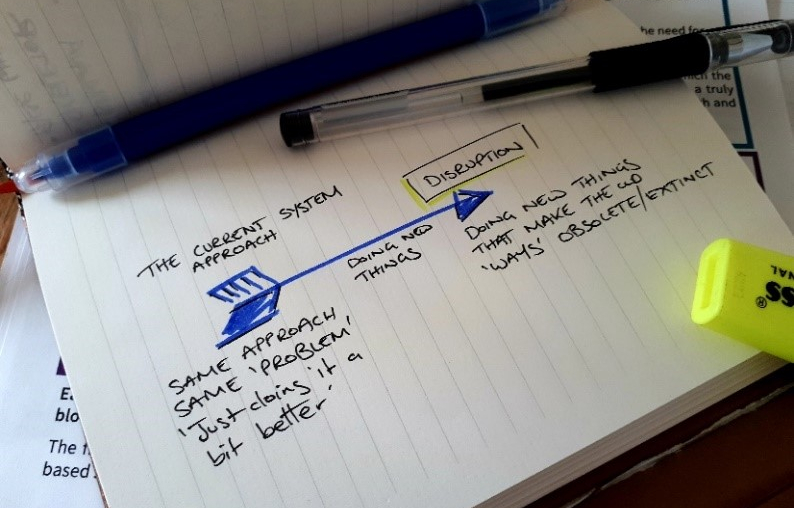Solving the Wrong Problem
Andrew Durman, PTS Coach at Mayday Trust looks at the difference between being innovative and disruptive when working with people going through tough times.
Last year I embarked on a new challenge as I made the temporary move from being a Mayday PTS Coach, to becoming part of the team leading the New System Alliance, working to create a paradigm shift in systems available to people experiencing tough times. As part of my preparations for my new role I explored the topic of disruption, specifically linked to how we can positively disrupt within our roles on the frontline and as organisations. The aim of this disruption is to create real #systemschange.
It really got me thinking about the sector and the systems we work in. When you look at the statistics, reports, press, etc. around homelessness and other tough times in England, it’s clear that the situation is getting worse. Yet new approaches and innovations are being launched all the time and have been since I started in this sector 12 years ago, so if all this energy and money is being invested why are we still experiencing the same problems?
To get some answers I looked outside the proverbial box and turned my attention to the field of design. This is an area I often look to for inspiration and it didn’t disappoint – cue an article describing ‘The disruptive design method’ by Dr. Leyla Acaroglu.

It efficiently answered my earlier question, if we always look at something in the same way (in this case people going through tough times), we won’t see anything more and nothing will change. Instead, we will keep asking the same questions and doing the same things over and over again.
This isn’t anything new, in fact, if I think back to my University days where I experienced a very similar situation. As part of an assignment, I was tasked with looking at improving the design of the Maclaren Buggy. My idea (last-minute inspiration taken from a Simpsons episode) was to combat the issue of buggies becoming unbalanced from their handles being overloaded with bags (apparently children don’t like to travel light!), causing them to topple over. My brilliant solution came in the shape of support stands that would swing out to counterbalance and support the buggy, stopping it from tipping backwards – amazing!
I was immediately challenged by my tutors, who dared to suggest I was focusing on the wrong problem. Apparently, the right solution would be to find ways to stop bags being placed on handles in the first place such as providing suitable storage within the buggy; I was simply creating an unnecessary product. Focus on the source of the problem to avoid it being an issue in the first place – sounds simple enough doesn’t it, yet why as a sector do we continuously focus on the symptom rather than the cause? We obsess over signposting people into appropriate services but fail to acknowledge or reflect on our role in that person’s situation and the impact the system has had on them. I have no idea if the Maclaren buggy made it through its tough time, but I haven’t witnessed any toppling incidents recently so I assume it was a positive outcome.
This theory also resonates with learning gained from the changes Mayday Trust made following the creation of Wisdom from the Street, an enquiry which captured the voices of people experiencing homelessness. After this deep listening and reflection, Mayday turned its back on the traditional deficit system and focused on developing the Person-led, Transitional and Strength-based Response (PTS), formerly known as the Personal Transitions Service.
Although successful, the development of the PTS also highlighted a different problem, something that had previously been disguised. Where the sector, including Mayday, focused on ‘fixing’ people’s problems, it was actually the system in need of some urgent attention. It was process-led, focused on deficits, segregating and dehumanising people. The system was causing harm.
Mayday has now joined forces with other organisations who recognised the same problem to form the New System Alliance; A platform for individuals and organisations who feel there is something wrong with the systems encountered by people experiencing tough times. A space to listen, to be heard and to ‘do something’ – to create a total change in thinking and develop a new response, a totally new system led by people, not deficits.
When I reflect on Mayday’s progress I see the form of disruption shown in Dr. Leyla Acaroglu’s article. By creating a new person-led system which works for individuals going through tough times, the outdated deficit system and associated approaches will be obsolete – a great example of positive disruption creating real #systemschange.
So how can we as individuals and organisations continue to positively disrupt? Maybe it’s time to stop doing what you’ve always done and look outside of your own proverbial box!
Intrigued? Why not read more PTS Blogs?


